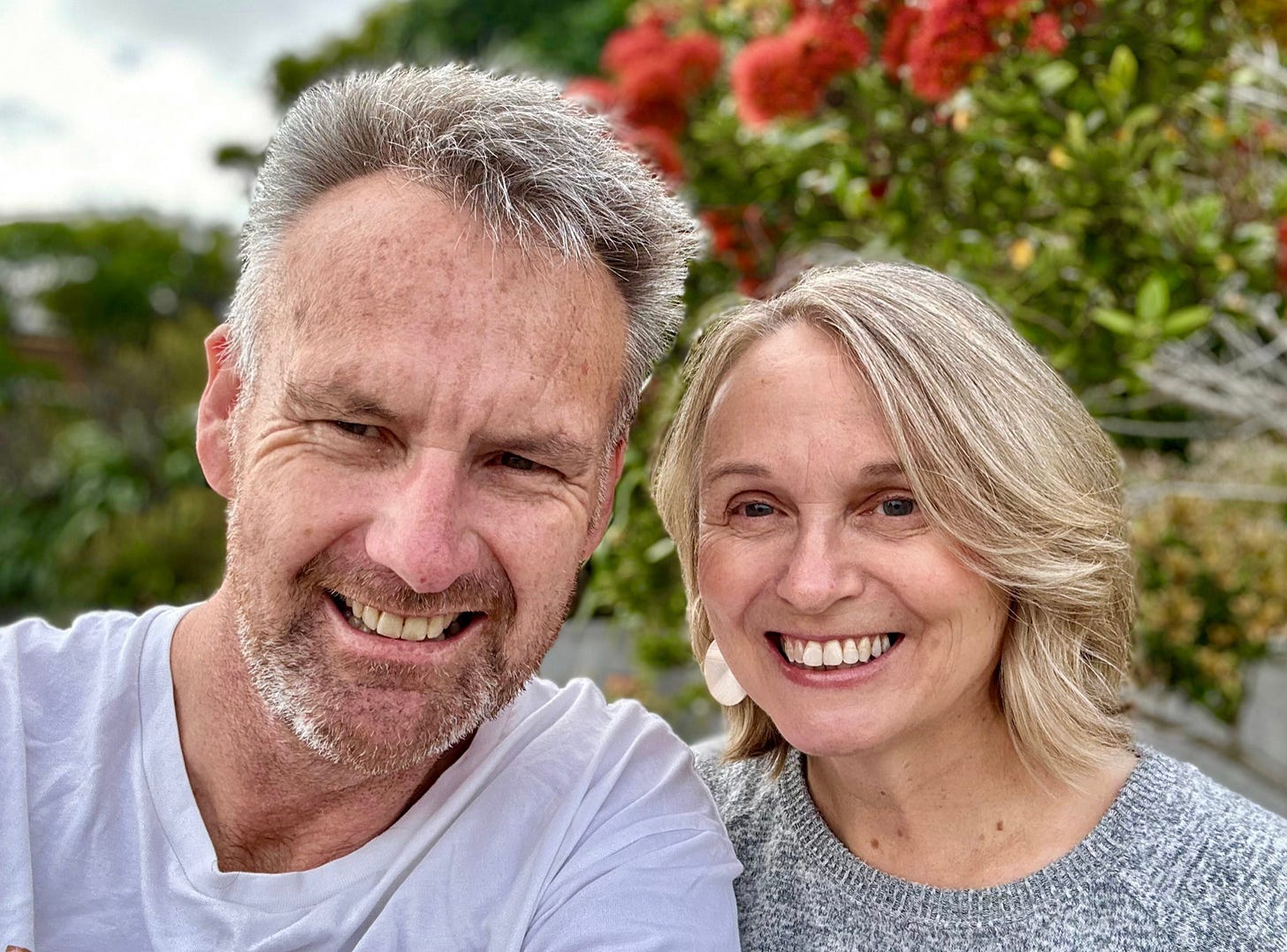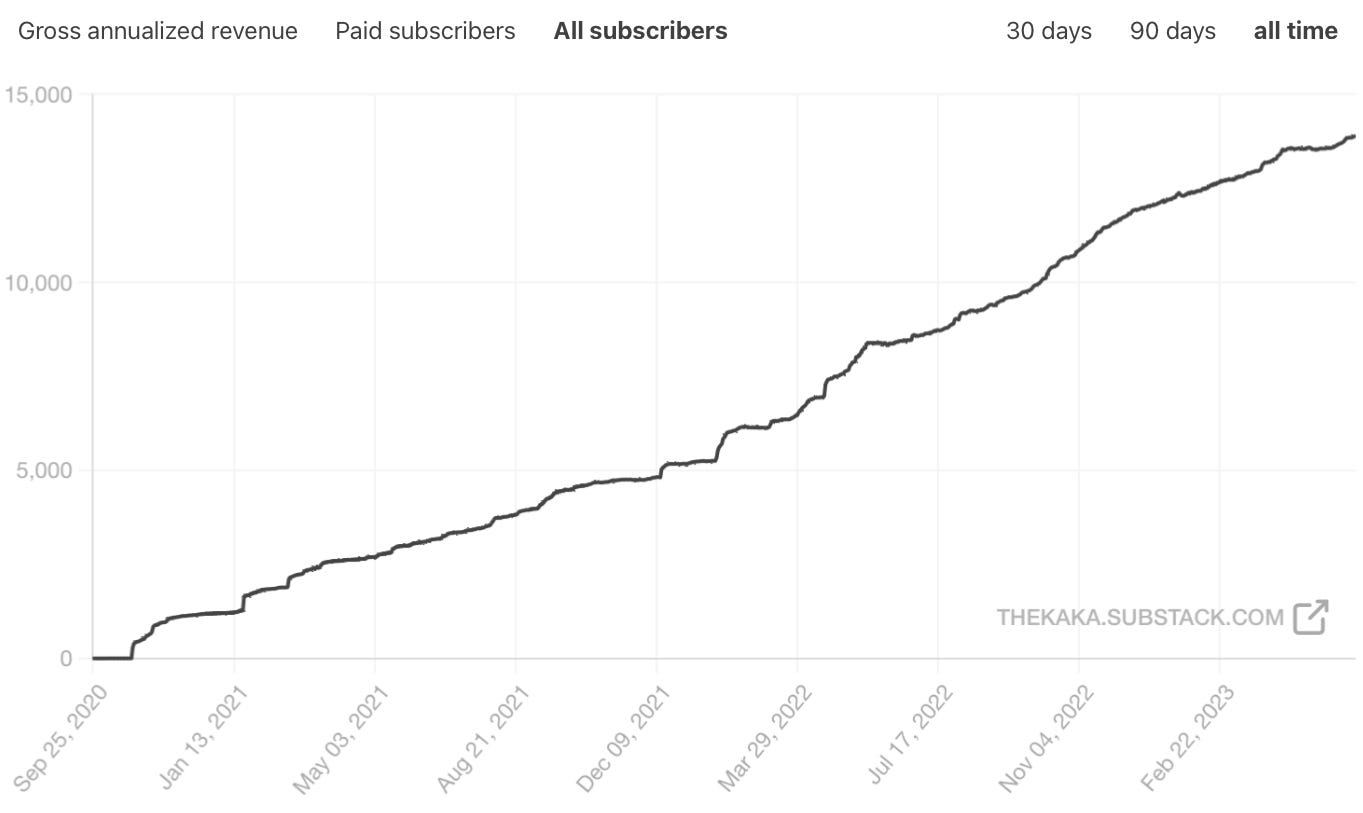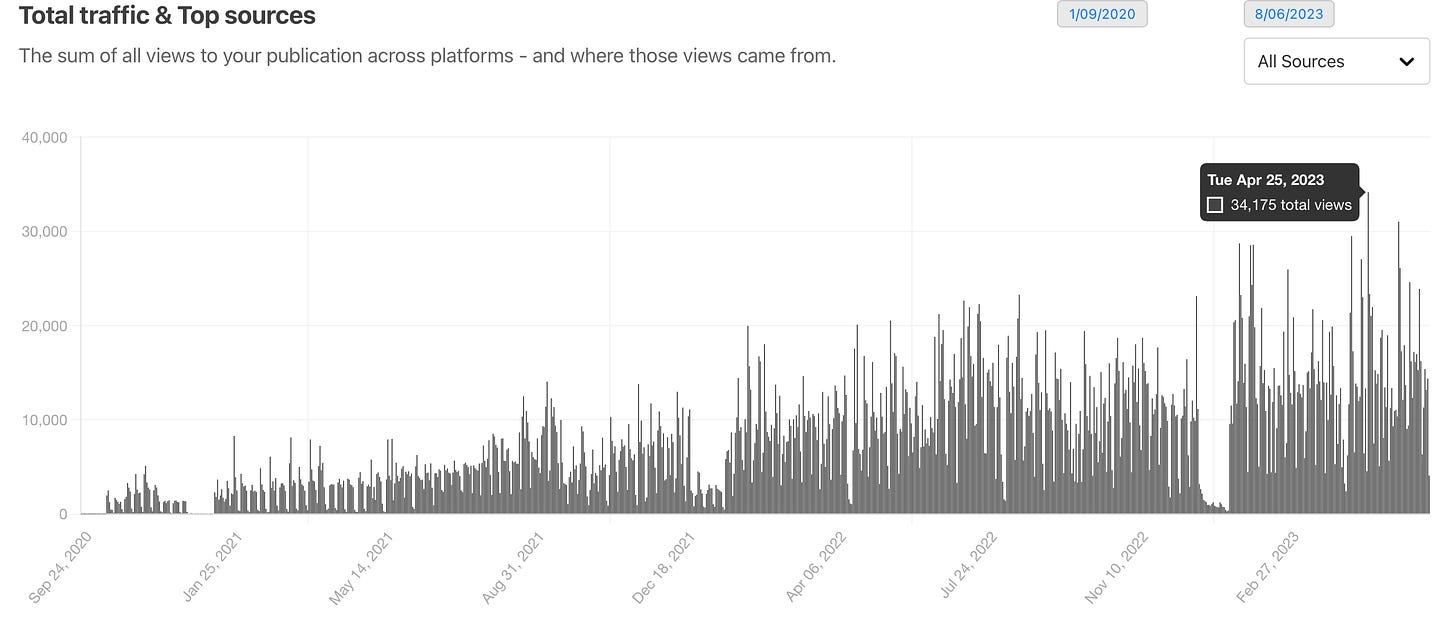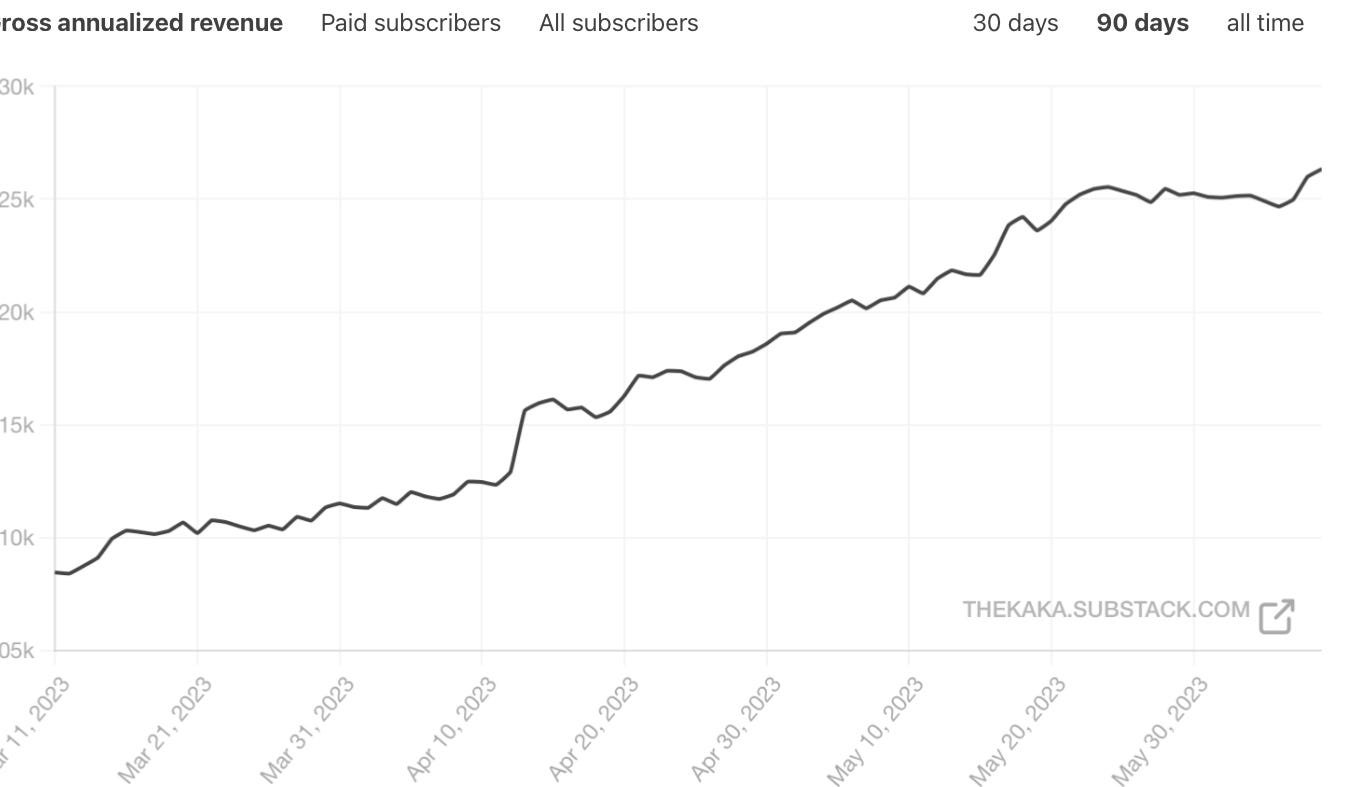The State of The Kākā nation in 2023
Our community of free & paid subscribers more than doubled to 14,000 since March 2022; Revenues rose, but slower; That’s because we’re broadcasting more widely in the public interest; We’re hiring
TL;DR: We’ve more than doubled The Kākā’s community of paying and free subscribers to almost 14,000 over the last year or so since our last State of The Kākā Nation report.
Revenue growth hasn’t been quite so fast, partly because we’ve opened up more of our journalism to everyone in the public interest. We see ways to keep growing in the year ahead.
We’re also about to start a separate daily podcast about the global economy and financial markets that will boost our capacity to do more articles and podcasts for The Kaka. So we’d like to hire another financial journalist or economist to help us produce this new podcast and further extend our coverage for The Kākā’s community. See a job description below and apply to help us spread our wings.1
How the Kaka is flying, and our direction of travel
Way back in late 2019 before Covid and before we had even launched The Kākā, Lynn and I organised a month-long holiday in France in mid 2020 with a few home exchanges with people who had already stayed in our place in Wellington. Then some things happened…but we’d always hoped we could re-arrange the home exchanges and have that holiday. Events kept intervening and we began to think it would never happen. We’ve even been reluctant to talk about it, in case we jinxed it again. We have touched a lot of wood over the last three years or so.
But now the moment has arrived. We’re writing and editing this on a plane somewhere over the Indian Ocean on our way to four weeks living in other peoples’ homes in Greece and France, which means we’re on holiday. Sort of. We plan to continue to do a cut-down version of the daily email newsletter with a short daily podcast attached (except for today because all you’d hear is the crying baby in 45C), although it’s possible I could miss one or two when we’re on the road and in between good data connections.
It also means I’m going to take a break from the weekly Ask Me Anything sessions and the weekly ‘Hoon’ webinar and podcast on Fridays until we resume on Friday July 7. We’re reserving the option to do a ‘pop-up’ ‘Hoon’ if there’s a major event.
This will give us our first real middle-of-the-year break in four years and means we can take a breath before launching the podcast and ramping up our coverage again ahead of the election on October 14. So now is a good time to step back a bit and update all our subscribers on how the last year or so has gone, and where we’d like to go next. It also doubles as a job advertisement for the person we’d love to join us to produce our podcasts and articles, and help us grow this community.
So how has The Kākā done?
We started producing The Kākā as a newsletter in late September 2020, with the eventual hope it could support itself with subscriptions within a couple of years. We turned on the paywall in late September 2021 when we had around 5,000 free subscribers. Within a year we had grown that to almost 9,000 subscribers overall, including over 1,600 paying subscribers, which made it our largest income source and a potentially viable way to make a living in the long run. We also added daily podcasts and our weekly ‘Hoon’ podcast. Here’s our ‘State of the Nation’ report from last year.
Since then, we’ve made the paid subscription tier free for students and teachers (anyone with a .ac.nz or .school.nz email address gets automatically upgraded from the free tier to the paid tier) and we started opening up a lot more of our articles and podcasts for everyone to read and listen to in full and share in the public interest. We’ve experimented a bit to see what works, and we’re grateful for the permission and support of paying subscribers whenever we do ‘give it all away.’
Somewhat surprisingly to me, the number of paying subscribers has kept growing, despite the paywall being lowered regularly and becoming more porous as we’ve gone on. As of June 9, there are around 3,900 on the paid tier, including about 1,900 subscribers who pay monthly and annually. Not everyone pays full price though because the half price introductory deals take a while to roll off.
Here’s the charts showing growth of total subscribers, traffic and revenues in that order.
‘I wonder what happens if we do this…’
A few weeks ago we extended the experiment by dropping the paywall for articles and podcasts completely and publishing all the daily emails and podcasts to everyone on both the free and paid lists immediately. It was and is risky because it means there isn’t a hurdle for potential new subscribers to jump over to get the fresh articles and podcasts day in and day out. We have kept the restriction that only those on the paid tier can comment and get access to The Kākā’s chat section, but ultimately there is a risk that fewer new fully paid subscribers join and some existing subscribers don’t resubscribe in full. That’s why I limited the experiment to a month.
So far, the results are encouraging. Our free subscriber list has started growing faster, which widens the audience for each article and podcast, but growth in paid subscriptions appears to have stalled. There seems to be something of a trade-off between reach and revenues, as is often the case in economics. It’s easiest to show that effect with the charts above showing how the number of subscribers overall and subscription revenues have grown and changed trajectory over the last three years. You can see total subscriber numbers and total page views and podcast downloads picking up in recent weeks as we opened up everything, but new revenues have flattened out.
A reach vs revenues tradeoff, it seems
It’s still early days, but it presents a conundrum of sorts. Do we sacrifice revenue growth so we can grow our overall audience and journalistic impact faster? Or do we hope that growing the overall group of free subscribers will eventually see more people convert from free to paid to be able to comment and get access to a more active part of The Kākā’s community in the Chat section. Ideally, we could grow both total reach and total revenues as our articles and podcasts spread more easily from in front of the paywall and we see more ‘frees’ convert to paid. You’re welcome to do that now if you’ve been hovering on the edge… ;)
The jury is still out for me and we’ll take another look when we’re fully back on deck in mid-July. My instincts are to open up as widely as possible before the election, given the public interest mission of what we do, but I’d welcome your feedback and ultimately it will depend on ensuring we keep making The Kaka more financially viable for Lynn and myself, and someone new.
A way to expand our viability and coverage
Talk about bury the lead. Given all the of the above, we’re now looking for a journalist or economist to help us produce a new separate economics and finance podcast and do between 10 to 30 hours a week for 48 weeks of the year from a quiet home-office anywhere in the world.
Here’s the job ad:
Journalist or economist wanted for podcasting and writing
The Kākā is looking for a financial or economic journalist or economist available to do 10 to 30 hours of podcasting and writing work per week at NZ$50/hour, with a guaranteed contract of at least one year. The work can be done flexibly with a broadband connection and microphone from a quiet home/office in any time zone.
We’re looking for applications from people of from all backgrounds who’d like to help run a daily news podcast for a broad audience in the Asia Pacific time-zone, as well as potentially produce emails and articles for The Kākā.
This is a highly flexible role with the hours of work set in discussion with the right candidate.
Hours can be from a mininum of ten hours per week, up to 30 hours per week. However, if the usual hours are less than 30 per week, you must be available and willing to increase the hours worked for up to 8 weeks of the year to provide extra cover.
You can also be located in any time zone, but be able to work on occasion from 4am to 8 am NZ Time to produce a daily podcast, which may suit someone in a European or US time zone better, but not exclusively.
Primarily, this work involves doing one or two 10 minute interviews each week day with an economist or market strategist on economic and financial market issues, including research and reading before the interviews, and editing and scripting afterwards. As mentioned above, the successful candidate would also need to be able to write and host the podcast for up to four consecutive weeks once or twice a year, along with being available to step in for the main host in the event of sickness etc. Training and guidance will be given.
It is envisaged the work for the daily podcast would usually take 10 hours a week, Monday to Friday, but would extend to 30 hours a week, Monday to Friday, when providing cover for the main host. During these periods (which would be for up to eight weeks per year) you would be primarily responsible for producing, writing and hosting the podcast.
If the successful candidate wishes their standard hours to be more than 10 hours week, these would be spent researching, interviewing and writing articles and podcasts for The Kākā, which is a Substack produced by Bernard Hickey daily on Aotearoa’s political economy, with a particular focus on housing affordability, climate change and poverty.
We especially welcome candidates who are not old, white blokes like Bernard, and who would like to learn how to write and podcast about economics and policy in a way that’s relevant and useful to a broad audience.
Email your application with a CV to bernard@thekaka.co.nz.
Ka kite ano
Bernard and Lynn
Don’t worry about putting your ability to write puns in your CV. We’ve got that covered.








Have a fantastic, well earned break away!
You are doing a great service bringing informed and objective reporting and discussion on the real issues facing the country. Big thanks